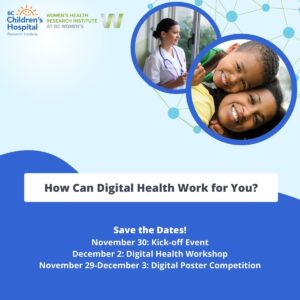
Announcing the 2021 Graduate and Fellowship Award in Women’s Health Recipients
The Women’s Health Research Institute (WHRI) is very pleased to congratulate the recipients of the 2021 Graduate and Fellowship Research Award in Women’s Health. This

The Women’s Health Research Institute (WHRI) is very pleased to congratulate the recipients of the 2021 Graduate and Fellowship Research Award in Women’s Health. This

The University of British Columbia has announced the recipients of the 2021 Faculty of Medicine Awards, which recognize “faculty and staff members for excellence in teaching, research,

Written by Candice Taguibao, WHRI’s Digital Health Research Manager Although digital tools have the potential to make care more accessible and convenient for many, there

We are excited to announce that the Women’s Health Research Institute is collaborating with the BC Children’s Hospital Research Institute (BCCHR) to host various activities

Congratulations to Kate Wahl who has been named a 2021 CIHR & Michael Smith Health Research BC co-funded Health System Impact Fellows. Kate’s work is in

October is Breast Cancer Awareness month, and we would be remiss if we didn’t speak to Dr. Paula Gordon. Dr. Gordon is a driving force
The Women’s Health Research Institute would like to acknowledge that we are uninvited guests on the unceded ancestral territories of the xʷməθkwəy̓əm (Musqueam), Skwxwú7mesh (Squamish), Stó:lo, and sel̓íl̓witulh (Tsleil-waututh) Nations.
As a provincial research institute committed to improving the health outcomes of women, including those across the 2SLGBTQIA+ spectrum, we recognize our responsibility in the collective effort towards establishing culturally safe health care systems and services that address health inequities among Indigenous peoples, especially Indigenous women, girls, and Two-spirit peoples.
We encourage all people involved in research to read both the Truth and Reconciliation Commission of Canada: Calls to Action and the In Plain Sight Report, and reflect on ways we can incorporate the recommendations into our work. As we gather in spaces together, we encourage you to reflect on your positionality on these lands and your personal commitments to reconciliation.